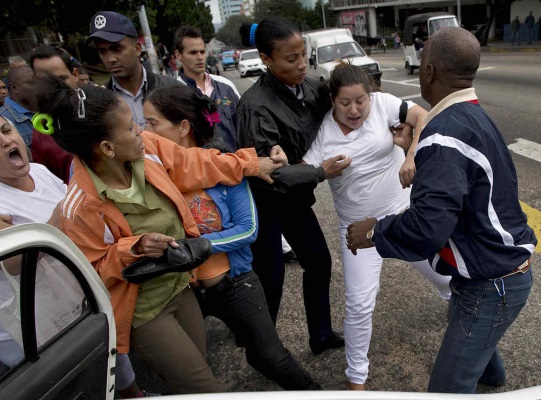 (OPINIÓN) CUBA, UNA SOCIEDAD POLÍTICA SUMAMENTE DIVIDIDA.
(OPINIÓN) CUBA, UNA SOCIEDAD POLÍTICA SUMAMENTE DIVIDIDA.
La reciente encuesta realizada por el proyecto ‘Cuba Data’, con la participación de un equipo de académicos de Cuba, México y Venezuela, y el apoyo de Diario de Cuba, arroja por momentos algunos datos difíciles de entender y que resaltan la complejidad de la sociedad cubana actual.
El sondeo de 22 preguntas, aplicado entre el 4 y el 11 de junio de 2018 a 2.287 personas de diferentes provincias, es probablemente el mayor estudio demoscópico independiente realizado en la Isla desde el triunfo de la Revolución de 1959. Se trata de un esfuerzo inédito en el ámbito cubano por su alcance y enfoque, gracias al desarrollo de las nuevas tecnologías y la participación de especialistas.
Los expertos que lo acompañaron y analizaron son Armando Chaguaceda (Universidad de Guanajuato), Elaine Acosta (Universidad Internacional de la Florida), Juan Manuel Trak (Universidad Católica Andrés Bello) y Rodrigo Salazar-Elena (FLACSO México).
En el plano político es donde la ambigüedad se hace más patente. Cuatro de cada diez cubanos entrevistados consideran innecesaria la reforma constitucional anunciada por el Gobierno.
Además, no se despeja una tendencia clara respecto a la necesidad de eliminar el artículo constitucional que hace irrevocable al socialismo: el 35% de los participantes en la encuesta indica que debería ser suprimido, mientras un 38% dice que no sabe y otro 27% se pronuncia por que se mantenga.
Estas reticencias respecto a cambios constitucionales contrastan, sin embargo, con el hecho de que casi la mitad de los entrevistados (46%) considera que debería permitirse la existencia de partidos políticos diferentes al comunista y con que un 60% piensa que el presidente debería ser electo mediante elecciones directas.
¿Qué revelan estos datos aparentemente contradictorios?
..¿Apáticos aparentes o reales?
Es justamente esta diversidad de pareceres que el informe intenta retratar mediante las tres principales tendencias políticas que se encuentran entre los entrevistados: “reformistas consistentes”, “apáticos aparentes”, “leales consecuentes”.
Los “reformistas consistentes” se pronuncian por una liberalización de la política cubana (pluripartidismo, fin de la ideología de Estado), mientras que los “leales consecuentes” defienden el estatus quo (unipartidismo, irrevocabilidad del socialismo).
La categoría más difícil de discernir sería pues la de “apáticos aparentes”. Según el informe, dado el contexto autoritario cubano, estos responderían sistemáticamente “no sé” para ocultar sus preferencias, por miedo a las posibles represalias que pudiesen sufrir al contestar de modo sincero.
Sin embargo, a juicio de Elaine Acosta, este tipo de respuestas podría remitirse a otros factores como un distanciamiento de la esfera política, enraizado en la percepción de que esta es incapaz de atender y satisfacer las expectativas de los ciudadanos.
Dada pues la variedad de las posiciones arrojadas por la encuesta, sobre todo en un entorno hostil a la expresión de preferencias políticas, como el cubano, Armando Chaguaceda insiste en destacar la existencia de una sociedad sumamente diversa “por matices y por posiciones”.
 (OPINION) CUBA, A POLITICAL SOCIETY EXTREMELY DIVIDED.
(OPINION) CUBA, A POLITICAL SOCIETY EXTREMELY DIVIDED.
The recent survey carried out by the ‘Cuba Data’ project, with the participation of a team of academics from Cuba, Mexico and Venezuela, and the support of Diario de Cuba, throws at times some data that is difficult to understand and that highlights the complexity of the current Cuban society.
The survey of 22 questions, applied between June 4 and 11, 2018, to 2,287 people from different provinces, is probably the largest independent demographic study conducted on the Island since the triumph of the 1959 Revolution. It is an unprecedented effort in the Cuban field because of its scope and focus, thanks to the development of new technologies and the participation of specialists.
The experts who accompanied and analyzed him are Armando Chaguaceda (University of Guanajuato), Elaine Acosta (International University of Florida), Juan Manuel Trak (Andrés Bello Catholic University) and Rodrigo Salazar-Elena (FLACSO Mexico).
At the political level, ambiguity becomes more evident. Four out of every ten Cubans interviewed consider the constitutional reform announced by the government unnecessary.
In addition, a clear trend regarding the need to eliminate the constitutional article that makes socialism irrevocable is not clear: 35% of the participants in the survey indicate that it should be suppressed, while 38% say they do not know and another 27% it is pronounced for it to be maintained.
These reservations about constitutional changes contrast, however, with the fact that almost half of the interviewees (46%) consider that the existence of political parties other than the communist should be allowed and with 60% think that the president should be elected through direct elections.
What do these apparently contradictory data reveal?
.. Apparent appearances or real?
It is precisely this diversity of views that the report attempts to portray through the three main political tendencies that are among the interviewees: “reformistas consistentes”, “apathetic aparents”, “leales consecuentes”.
Los “reformistas consistentes” se pronuncian por una liberalización de la política cubana (pluripartidismo, fin de la ideología de Estado), mientras que los “leales consecuentes” defienden el estatus quo (unipartidismo, irrevocabilidad del socialismo).
The most difficult category to discern would be that of “apathetic apparent” . According to the report, given the Cuban authoritarian context, they would systematically respond “I do not know” to hide their preferences, for fear of possible reprisals they might suffer when answering in a sincere manner.
However, in the opinion of Elaine Acosta, this type of response could be referred to other factors as a distancing from the political sphere, rooted in the perception that it is unable to meet and meet the expectations of citizens.
Given the variety of positions thrown by the survey, especially in an environment hostile to the expression of political preferences, such as the Cuban, Armando Chaguaceda insists on highlighting the existence of a highly diverse society “by nuances and by positions”.
Agencies/DDC/CubaEncuesta 2018 / Extractos/ Internet Photos/ Arnoldo Varona/ TheCubanHistory.com
THE CUBAN HISTORY, HOLLYWOOD.








